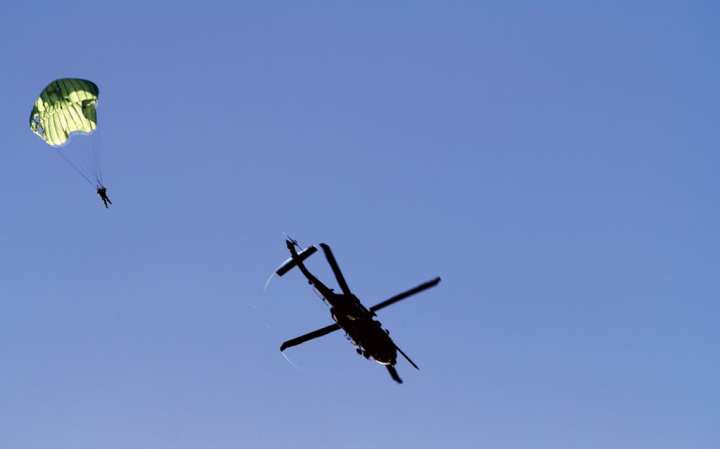JUNE 2014
Interview with Lt. Gen. Charles Cleveland, USA, Commanding General, U.S. Army Special Operations Command (USASOC)
Lt. Gen. Charles Cleveland, the commander of U.S. Army Special Operations Command (USASOC), checks his canopy after jumping from an MH-60 Black Hawk helicopter assigned to the 160th Special Operations Aviation Regiment (Airborne) during a rotary-wing airborne operation over Biscayne Bay near Homestead, Fla., Feb. 21, 2014. Cleveland was one of 15 paratroopers who took part in the overwater static-line jump. U.S. Department of Defense photo by Sgt. 1st Class Alex Licea
Lt. Gen. Charles T. Cleveland assumed command of U.S. Army Special Operations Command July 24, 2012. Previously, Cleveland was commanding general of Special Operations Command Central at MacDill Air Force Base, Fla., from 2008 to 2011. Cleveland commanded Special Operations Command South from 2005 to 2008, and from 2003 to 2005 he served U.S. Army Special Operations Command as the chief of staff and later the acting deputy commanding general.
Cleveland commanded 10th Special Forces Group (Airborne) from 2001 to 2003 and served as commander, Combined Joint Special Operations Task Force-North, during Operation Iraqi Freedom. Cleveland served with the 10th Special Forces Group (Airborne) at Fort Carson, Colo., from 1995 to 1999 when he served as the group executive officer, group deputy commander and battalion commander of the 3rd Battalion, 10th Special Forces Group (Airborne). From 1993 to 1995, he served as an action officer in the Special Operations Division on the Joint Staff at the Pentagon and later as the Special Forces field grade assignment officer.
A Special Forces officer, Cleveland served with the 3rd Battalion, 7th Special Forces Group, Fort Davis, Panama, in 1987, where he was a detachment commander, company commander, and battalion operations officer until 1990. Cleveland began his Special Operations career with an assignment with the 441st Military Intelligence Detachment, 10th Special Forces Group (Airborne),Fort Devens, Mass.
John D. Gresham: What is the current status of USASOC, and what has been your personal focus since taking over from Lt. Gen. John F. Mulholland?
"As we transition into the post Iraq and Afghanistan environment, our mission must be clear. We are tasked with providing the nation with the world’s premier special operations units, capable of executing special warfare and surgical strike operations while simultaneously supporting joint force commanders worldwide."
First we need to address a key capability gap for “high-end” UW [unconventional warfare]. By “high-end” UW we mean the full range of conditions for unconventional warfare, such as where resistance movements are just beginning and operating clandestinely themselves, the occupying power is highly capable, limited safe havens exist, and/or where the degree of risk is exceptionally high.
Second, we needed to mature the Army SOF profession. For more than half of the 25 years USASOC has existed, we will have been engaged in constant combat, and what we are learning is that combat is a great accelerant for learning and maturation. We now have these increased roles and responsibilities, not at just the tactical level, which is what we have been very good at. In fact, we have been created to provide that to the nation – high-end formations that provided strategic effect. We now have matured into a role where we are providing campaign level effects, and that means that we have a presence now and there is a need for SOF thinking – what I would call SOF operational art – at the operational level, that thing that ties tactics to strategy. Now there are ties in there that are uniquely SOF that represent, in my view, an art form as to how we combine surgical strike capability and special warfare capability, and conventional capabilities. That is where the future is headed, and USASOC will help lead in that future.

No comments:
Post a Comment